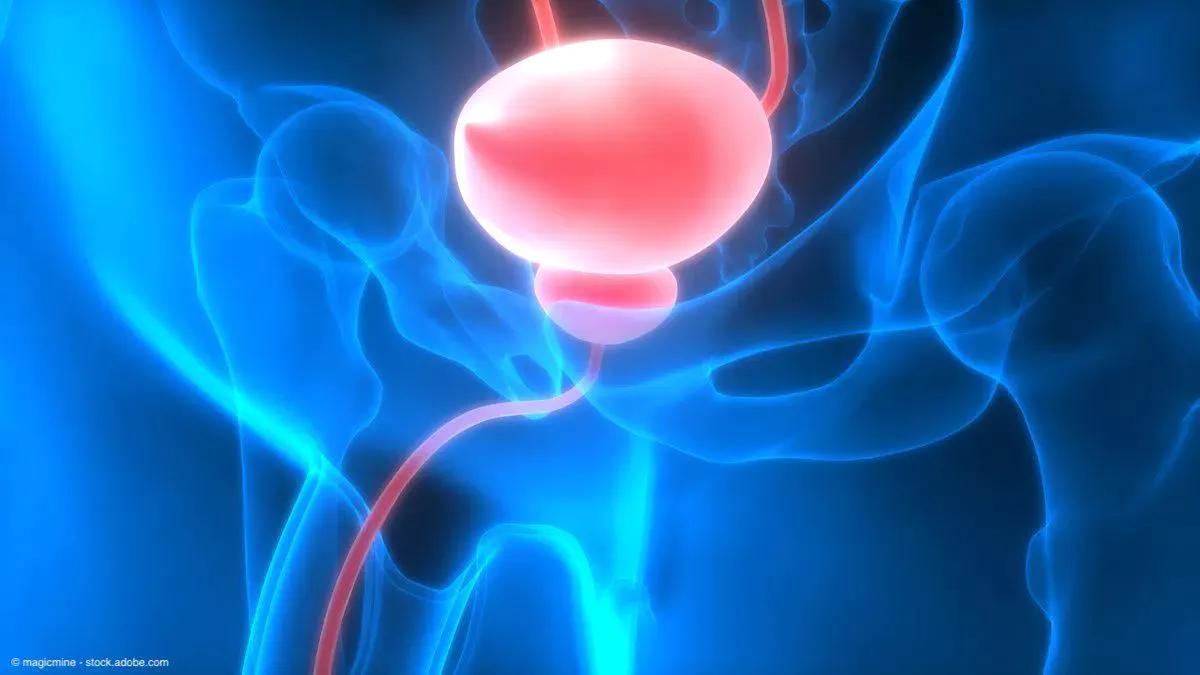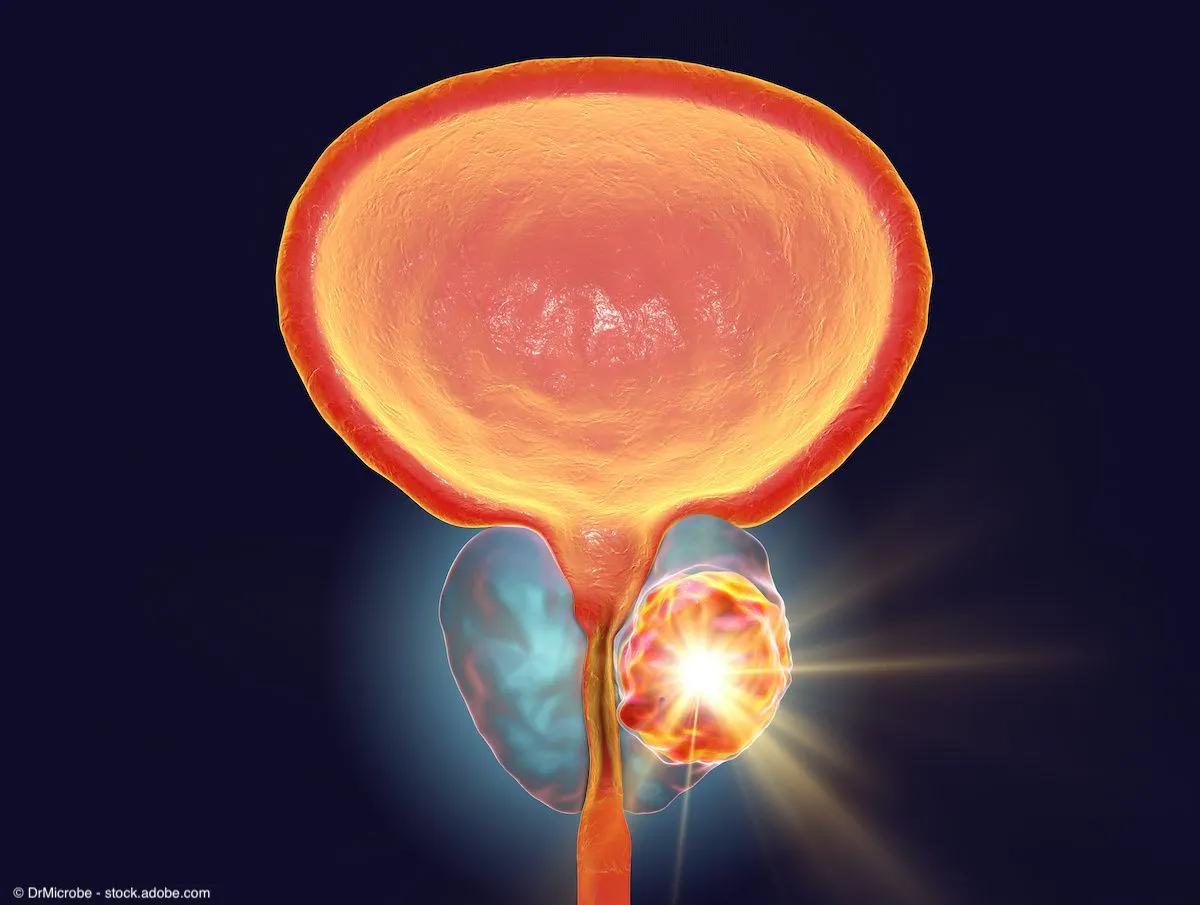News
Article
A new standard emerges in advanced urothelial carcinoma after decades of first-line chemotherapy
Author(s):
Data from the EV-302 trial showed a doubling of progression-free survival and overall survival with the ADC/checkpoint combination versus standard chemotherapy.
The combination of the antibody-drug conjugate (ADC) enfortumab vedotin (EV) and the immune checkpoint inhibitor pembrolizumab has emerged as a new frontline standard for the treatment of patients with advanced urothelial cancer, supplanting platinum-based chemotherapy. Data from the large EV-302/KEYNOTE-A39 clinical trial, presented at the 2023 European Society of Medical Oncology Congress, showed a doubling of progression-free survival (PFS) and overall survival (OS) with the ADC-checkpoint combination versus standard chemotherapy.
The EV-pembrolizumab combination is now being explored in the neoadjuvant setting in clinical trials of localized muscle-invasive bladder cancer. Cleveland Clinic is participating in the KEYNOTE-905 trial comparing EV-pembrolizumab to pembrolizumab and upfront radical cystectomy, with Dr. Gupta serving as the principal investigator.

Approximately 200,000 deaths occur annually worldwide from advanced urothelial cancer. Despite sequential chemotherapy and immunotherapy, long-term survival remains poor for patients with advanced bladder cancer, creating an urgent need for innovative treatment combinations, says Shilpa Gupta, MD, Director of Genitourinary Medical Oncology at Cleveland Clinic Cancer Institute and a co-author of the study. Cleveland Clinic was one of the highest enrolling sites for the practice-changing study, which included 886 patients with previously untreated, locally advanced or metastatic urothelial carcinoma.
Platinum-based chemotherapy has been the standard of care for more than three decades, with median survival of 12 to 14 months. “Cleveland Clinic has been at the forefront of this groundbreaking trial EV-302/KEYNOTE-A39 demonstrating vastly superior outcomes with this new approach in the first-line setting,” says Dr. Gupta. “We had not seen an improvement in overall survival before.”
At a median follow-up of 17.2 months, the EV-pembrolizumab combination arm had a median PFS of 12.5 months versus 6.3 months in the chemotherapy arm, representing a 55% improvement in median PFS (P<0.00001). Median OS improved to 31.5 months in the EV-pembrolizumab arm versus 16.1 months with standard chemotherapy that consisted of cisplatin or carboplatin plus gemcitabine, corresponding to a 53% improvement in OS (P<0.00001). The overall response rate was 68% with EV-pembrolizumab compared with 44% with chemotherapy, and the complete responses rate was 29% with EV-pembrolizumab compared with 12 % with chemotherapy.
Benefit observed regardless of cisplatin eligibility
The benefit to EV plus pembrolizumab was consistent regardless of cisplatin eligibility or the expression of PD-L1 on tumors. (Pembrolizumab binds to the PD-1 receptor and blocks its interaction with PD-L1 to exert its effect). Almost 60% of patients in the chemotherapy arm received subsequent immune checkpoint therapy and 30% of patients received maintenance avelumab. At the time of data analysis, one third of patients in the EV plus pembrolizumab arm remained on treatment compared with none in the chemotherapy arm.
The safety profile of EV-pembrolizumab was generally manageable, with no new safety signals observed. The median number of cycles received was 12 in the EV-pembrolizumab arm. Some 56% of patients in the enfortumab plus pembrolizumab arm experienced grade ≥3 adverse events (AEs) compared with 70% of the patients who received chemotherapy. The adverse event profile with EV is unique and needs to be well managed, says Dr. Gupta. Most common grade >3 AEs in the chemotherapy arm were hematologic in nature (anemia, 56.5%; neutropenia, 41.6%; thrombocytopenia, 34.2%). In contrast, the most common grade ≥3 AEs in the EV-pembrolizumab arm were primary sensory neuropathy (50.0%), pruritus (39.8%), alopecia (33.2%), maculopapular rash (32.7%) and hyperglycemia (6%).
“Patients don’t always report their side effects when on such combinations, so it is important for clinicians to perform a thorough history and examination to not miss toxicities such as skin rash and neuropathy, which can be quite severe,” she says. “Neuropathy can be debilitating, so this treatment combination should be used diligently, and may necessitate dose reductions in some patients.”
EV-302/KEYNOTE-A39 follows in the footsteps of EV-103/ KEYNOTE-869, an open-label, multicohort, multicenter, phase 1b/2 clinical trial that enrolled patients with locally advanced or metastatic disease who were not eligible for cisplatin-containing chemotherapy and had not received prior systemic therapy. Dr. Gupta was a co-investigator for EV-103/KEYNOTE-869 and presented the four-year follow-up results at the 2023 meeting of the American Society of Clinical Oncology (ASCO). On the basis of positive results from the EV-103 study, earlier in 2023, the U.S. Food and Drug Administration granted accelerated approval to EV-pembrolizumab for the treatment of patients with locally advanced or metastatic urothelial carcinoma ineligible for cisplatin chemotherapy. The new data should expand this indication to all comers, regardless of cisplatin eligibility.
The EV-pembrolizumab combination is now being explored in the neoadjuvant setting in clinical trials of localized muscle-invasive bladder cancer. Cleveland Clinic is participating in the KEYNOTE-905 trial comparing EV-pembrolizumab to pembrolizumab and upfront radical cystectomy, with Dr. Gupta serving as the principal investigator.
Newsletter
Stay current with the latest urology news and practice-changing insights — sign up now for the essential updates every urologist needs.
















